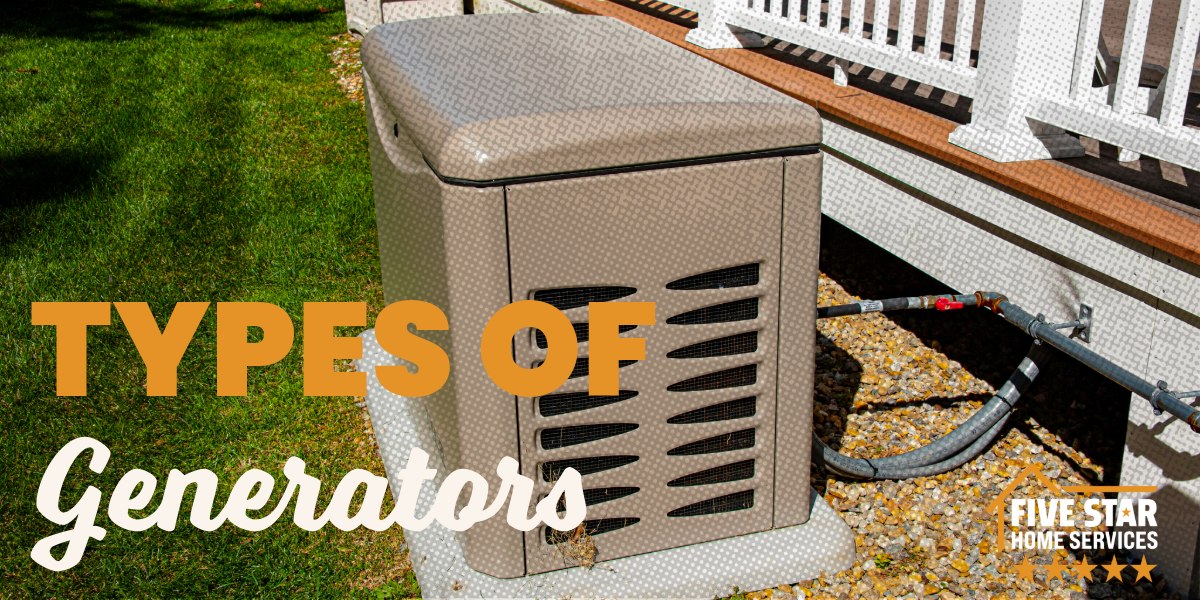Power outages can happen anytime, whether it’s because of a storm, a grid issue, or surprise maintenance. Suddenly, you’re left without your appliances, heat, or light, and your whole routine gets thrown off. That’s why having a generator is such a game-changer. It’s your reliable backup to keep things running smoothly when the power goes out.
But with so many types of generators out there, how do you know which one’s right for you? Whether you’re looking to keep your home powered during an outage or need electricity for camping trips, this guide breaks it all down. We’ll cover the types of generators, how they work, and how to pick the best one for your needs. Let’s dive in!
What Are the Different Types of Generators?
Generators come in a variety of sizes to meet different needs. Residential generators are smaller and perfect for powering homes during outages, ensuring essential appliances like refrigerators, lights, and heating systems keep running smoothly.
1. Standby Generators
Standby generators, also known as whole-house generators, are permanently installed outside your home and kick in automatically when the power goes out. These generators are designed to power your entire house, from the refrigerator and lights to HVAC systems.
Benefits of Standby Generators:
- High Reliability: Automatically activate during outages, ensuring uninterrupted power.
- Powerful Output: Can support the entire home, making them ideal for larger households.
- Convenience: They run on natural gas or propane, so there’s no need to refuel manually.
One key consideration is the professional installation these generators require, which can add to the upfront cost but ensures seamless operation. For more on installation costs, check out our Whole Home Generator Cost Guide.
2. Portable Generators
Portable generators are a flexible, budget-friendly solution for temporary power, with fuel options like gasoline and diesel. Choosing the right generator depends on your needs, such as powering your home during outages or camping trips.
Gasoline can degrade over time during long outages, but using ethanol-free gasoline can help. Dual-fuel generators that use both gasoline and propane offer an even more reliable option. Whether for outages or outdoor activities, portable generators are a dependable choice.
Benefits of Portable Generators:
- Portability: Easy to move wherever needed.
- Affordability: Lower upfront cost compared to standby systems.
- Versatility: Great for powering essentials like refrigerators, lights, or tools.
However, they do require a manual start and typically run on gasoline or diesel, meaning you’ll need to store and refuel them as needed. To better understand their uses and compare them with standby systems, check out Portable vs. Standby Generator.
3. Inverter Generators
Compact, quiet, and fuel-efficient, inverter generators are an excellent choice for powering sensitive electronic equipment like laptops, phones, or medical equipment. These generators provide stable electricity with specific voltage and frequency requirements, making them ideal for devices that rely on precise power delivery to function effectively. They offer a middle ground between portable and standby systems.
Benefits of Inverter Generators:
- Quieter Operation: Designed to operate with minimal noise.
- Fuel Efficiency: Adjust power output based on real-time needs, saving energy.
- Safe for Electronics: Produce clean power that won’t damage sensitive devices.
Their smaller size makes them ideal for occasional use or smaller homes, but they may not be suitable for powering an entire house.
What Type of Generator Do You Need?
Choosing the right generator isn’t a one-size-fits-all decision—it depends on your specific needs, home setup, and budget. To help you make the right choice, we’ve broken it down into key considerations:
1. Home Size
The size of your home plays a big role in choosing the right generator.
- For larger homes: A standby generator is usually the best option, as it can power multiple appliances and systems during an outage.
- For smaller spaces: A portable or inverter generator might be all you need for basic power during emergencies.
2. Power Needs
Think about what you’ll need to keep running if the power goes out.
- Do you need to power major appliances like refrigerators, HVAC systems, or water heaters?
- Or are you just looking to keep the lights on and charge your devices?
- Identifying these needs will help you determine how much power your generator should provide.
3. Frequency of Outages
How often do you experience power outages?
- Frequent outages: A standby generator is worth the investment for consistent, reliable power.
- Occasional outages: A portable or inverter generator should cover your needs without breaking the bank.
4. Budget
Your budget is another key factor.
- Portable and inverter generators are more affordable upfront and great for those on a tighter budget.
- Standby generators, while more expensive initially, offer long-term reliability and convenience—an investment that pays off if you experience frequent outages.
Need More Help?
Still unsure what size or type of generator is best for your home? Finding the right generator is essential for keeping your home powered and comfortable, whether you’re preparing for storm season or simply looking for added peace of mind. Our home generator size guide is a helpful resource when choosing the right generator size.
Generator Fuel Types: Pros & Cons
Choosing the right fuel type for your generator is essential—fuel impacts everything from maintenance and costs to usability. Let’s break down the most common options and their pros and cons to help you decide which is best for your needs.
Gasoline
- Pros: Gasoline is easy to find and simple to refuel, making it a convenient choice for many users.
- Cons: It has a short shelf life and requires frequent refueling. The size of the fuel tank plays a big role in runtime—larger tanks mean longer operational periods. However, you’ll also need to maintain the fuel system regularly to prevent issues like carburetor deposits caused by stagnant gasoline.
Diesel
- Pros: Diesel generators are incredibly fuel-efficient and durable. They also allow for better long-term fuel storage compared to gasoline.
- Cons: Diesel generators tend to cost more upfront and produce more emissions. Regular maintenance is key to avoiding fuel degradation.
Propane
- Pros: Propane is a clean-burning fuel that’s quieter to operate than gasoline or diesel.
- Cons: You’ll need to invest in separate storage tanks, which can add to the initial cost.
Natural Gas
- Pros: If your home is already connected to a natural gas line, this can be a super convenient option. Natural gas generators offer continuous power with lower emissions.
- Cons: These generators aren’t very portable and rely on local gas supply lines, which can be a problem during emergencies or maintenance work.
How Much Does a Standby Generator Cost?
Choosing the right standby generator starts with understanding the costs involved. These systems are a significant financial investment, typically ranging from $5,000 to $10,000 or more, depending on the brand, size, and capacity. Keep in mind, installation and additional factors like permits or fuel setup can also add to the total cost.
While the upfront price may feel steep, many homeowners agree that the peace of mind and uninterrupted power supply during outages make it worth every penny. Our home generator cost guide walks you through how to budget for one.
How Long Do Generators Last?
The lifespan of a generator depends on its type and how well it’s maintained. Let’s break it down:
- Standby Generators: These are built to last and, with proper maintenance, can run for 10-15 years.
- Portable Generators: These tend to wear out faster due to frequent handling and storage.
Diesel generators, in particular, are known for their durability, but like all generators, they need regular maintenance to perform their best. To help your generator run smoothly for years, make sure to:
- Change the oil regularly.
- Inspect the battery and spark plugs.
- Schedule seasonal checkups.
For standby generators, professional maintenance is especially crucial. Wondering why? Check out our Licensed Electrician Guide to learn more. With consistent care, your generator can provide reliable backup power whenever you need it most!
Why Professional Installation and Maintenance Matter
Thinking about installing a generator yourself? It might seem straightforward, but there are real risks involved—like electrical hazards and carbon monoxide poisoning.
A key part of any safe setup is a transfer switch, which connects your generator directly to your home’s electrical panel. This eliminates the need for unsafe extension cords, which can overload circuits and pose safety risks.
Here’s how a licensed professional can help:
- Optimize performance with a proper installation.
- Ensure compliance with local safety codes.
- Minimize risks to protect your family.
Using a transfer switch offers a safer, more reliable way to power essential devices during outages—and gives you peace of mind when it matters most.
Your Next Step to Reliable Power
Whether you’re considering a whole-house generator, a portable model, or even a solar-powered option, it’s all about choosing the right fit for your home and budget. Generators not only keep your family comfortable during outages but also protect your sensitive electronics.
At Five Star Home Services, we specialize in generator installation and servicing. Our expert team delivers five-star service, ensuring your home is safer and better prepared for power outages.
Visit our Generator Services Page for more details, or schedule your free home generator estimate today! Let’s make sure you’re prepared for whatever comes your way.


